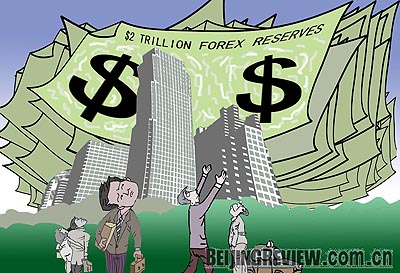|

China's rapid economic development over the past decades has brought in huge social wealth, amassing the largest foreign exchange (forex) reserves in the world at $2 trillion. When financial turbulence crippled the global economy, the mammoth foreign currency holdings quickly shrank in value as a result of the U.S. dollar's devaluation.
Professor Zhang Weiying, Dean of the Guanghua School of Management, Peking University, has suggested that the Chinese Government give half of its forex reserves, about $1 trillion, to the people and allow them to spend the windfall of $770 per capita, in order to boost consumption and increase household assets. Zhang's proposal has been, so far, the most aggressive economic stimulus measure based on government-subsidized consumption in China, compared with others, such as giving each Chinese citizen a 1,000-yuan ($146.24) shopping voucher.
Opponents say that Zhang is ill-advised to make the proposal, because it would risk the government's capacity to deal with global economic affairs if implemented and most middle- and low-income earners might save the money instead of spending it.
Gao Xiqing, General Manager of the China Investment Corp., a sovereign wealth fund that manages $200 billion of China's $2-trillion forex reserves, hit back, saying that China's economic strength has not yet reached the level of developed economies. If dollar-denominated assets were sold off, he said, the value of the U.S. dollar would plunge further, which would in turn depreciate China's forex reserves.
Zhang's supporters blame managers of forex reserves for largely buying into U.S. treasury bonds, because an increasingly weakening U.S. dollar has resulted in huge losses. Since the government is proposed to hand out only half of total forex reserves, the remaining half will be enough to handle economic affairs, they say.
Wealth redistribution
Li Huafang (Oriental Morning Post): Maintaining huge amounts of forex reserves is a costly practice. Though people diverge on the appropriate size of China's foreign currency holdings, nobody believes it should top $1 trillion.
Now, the government has invested 70 percent of China's forex reserves into assets denominated in the U.S. dollar. Since the dollar declines, the assets' value has remarkably fallen.
The fact that forex reserves are in the hands of the government also prevents the public from using the huge amount of money to finance their businesses, which are sometimes highly profitable. Worse still, mandatory sales of hard currency receipts by businesses to the government risk driving up the inflation rate.
In regard of unpredictable difficulties facing the Chinese economy, Zhang's proposal at least provides a new solution for consideration.
A Xi (The Beijing News): Forex reserves are public wealth in foreign currencies and belong to the whole nation.
It is true that forex reserves are used for foreign trade settlements, and thus vital to stabilize the currency system. But the problem is that China's forex reserves top the world at staggering $2 trillion.
Usually, forex reserves of one nation are proportional to 10 percent of its gross domestic product. China's gross domestic product stood at $25 trillion yuan ($3.65 trillion) in 2007, and its forex reserves therefore should be around 2.5 trillion yuan ($365.4 billion). But the present amount far surpasses that level. If we take out half of the reserves for wealth redistribution, it won't negatively affect the country's financial security.
Xue Yong (Information Times): Even if the government handed out half of its forex reserves, mostly in the form of U.S. treasury bonds, to the people, many recipients would keep them to earn interest. This means the worst scenario of a sell-off of dollar-denominated assets is unlikely true.
Ordinary people should have a bigger say in dealing with large public funds. Otherwise, an overly developed bureaucracy may easily breed poor investment decisions, which will cost millions of dollars for nothing.
Dong Hui (Modern Express): The proposal to hand out forex reserves, though unusual, might be feasible. When the economic crisis struck, it became necessary to redistribute the national wealth between the government and people, in order to improve the investment efficiency.
We need our forex
Dou Hanzhang (www.qianlong.com): China currently implements real-time settlements when dealing with forex accounts. Profits earned by imports and investment in foreign currencies are required to convert into renminbi, and forex reserves are uniformly managed by the central bank. Forex reserves are in fact the government's liabilities to its people. Since the central bank has issued renminbi equivalent of its foreign currency holdings, it must ensure the safety of the assets to prepare for possible foreign trade deals, redemption of foreign funds and regular foreign exchange transactions.
| 